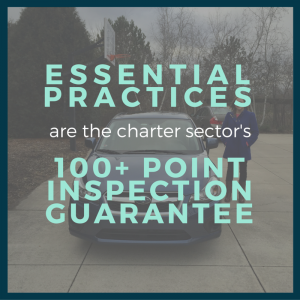Last month, NACSA released its Index of Essential Practices, an annual look at how authorizers around the country report implementing 12 operating practices that distill 25 years of authorizing experience into a clean, clear checklist, the 12 Essential Practices.
While getting ready to help launch the report, I also happened to be scouring the Chicagoland area for a used Subaru Impreza, my first major car purchase. As someone who is new to the world of authorizing, this happy coincidence in timing helped me better understand the 12 Essential Practices as the “100+ point car inspection” of the charter sector.
 We all want to know what to watch out for when inspecting potential cars. Reports like Carfax establish a baseline of checks that need to be conducted by the seller to give buyers the highest likelihood of selecting a trusty car. Any accident damage? May seem obvious, but I want to be 100% sure the answer is NO before signing the check (or loan agreement).
We all want to know what to watch out for when inspecting potential cars. Reports like Carfax establish a baseline of checks that need to be conducted by the seller to give buyers the highest likelihood of selecting a trusty car. Any accident damage? May seem obvious, but I want to be 100% sure the answer is NO before signing the check (or loan agreement).
Does having a 100+ point car inspection guarantee my car won’t prove to be a lemon in a year? Not exactly. But as someone who doesn’t know a spark plug from a sprocket, it gives me a share of confidence that the folks who are selling me the car did everything within their power to ensure it was not going to fail on me, at least not for any predictable reason.
Similarly, the 12 Essential Practices create a national baseline for the process of opening, monitoring and closing charter schools. The Index allows authorizers to reflect on each practice and “check the box” if they are implementing them.
Does a perfect score on the Index guarantee that all schools approved by an authorizer will be great? No, and that is not the point. The Index simply guarantees that an authorizer did everything within its capacity to make sure the schools it is overseeing have what it takes to succeed, that they are avoiding predictable pitfalls.
One thing I have learned from my new colleagues at NACSA is that we never want to be in the business of micromanaging (or attempting to micromanage) authorizers. Authorizers do context-specific, nuanced work to meet radically different community needs. We would not expect car safety inspection lists to anticipate the impact of the kind of oil I will select to use in the future, nor would we expect them to account for unanticipated traffic or weather patterns.
While I love my Subaru Impreza (this is not a Subaru advertisement, I promise), what I love more is the knowledge that I work among people who are doing their best, every day, to ensure kids get the best chance at a great education.


